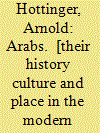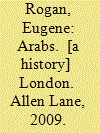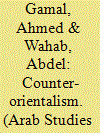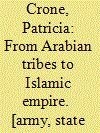|
|
|
Sort Order |
|
|
|
Items / Page
|
|
|
|
|
|
|
| Srl | Item |
| 1 |
ID:
039982


|
|
|
|
|
| Publication |
London, Thames and Hudson, 1963.
|
| Description |
344p.Hbk
|
|
|
|
|
|
|
|
|
|
|
|
Copies: C:1/I:0,R:0,Q:0
Circulation
| Accession# | Call# | Current Location | Status | Policy | Location |
| 000903 | 909.04927/HOT 000903 | Main | On Shelf | General | |
|
|
|
|
| 2 |
ID:
092423


|
|
|
|
|
| Publication |
London, Allen Lane, 2009.
|
| Description |
vii, 533p.Hbk
|
| Standard Number |
9780713999037
|
|
|
|
|
|
|
|
|
|
|
|
Copies: C:1/I:0,R:0,Q:0
Circulation
| Accession# | Call# | Current Location | Status | Policy | Location |
| 054619 | 909.04927/ROG 054619 | Main | On Shelf | General | |
|
|
|
|
| 3 |
ID:
134012


|
|
|
|
|
| Publication |
2014.
|
| Summary/Abstract |
Retranslation is a foundational postcolonial metaphor that might highlight the new horizons of transcultural and transnational relations and their political backdrop. By the same token, Arab-British migrant narratives are of special relevancy to both translation and cultural studies, since migrant identity and writing are closely associated with the politics of translation, rewriting, relocation, and cross-cultural pollination. This contribution explores the role of counter-discourses in general and counter-Orientalism in particular in the contemporary fiction of one of Arab-British writers. In particular, the article focuses on the textual representations of invisible Arab men and women and the East-West cultural exchange in the writing of the Sudanese feminist and Scottish immigrant Leila Aboulela (1964-). Drawing on the counter-traditional concept of translation as engagement rather than transfer, this article attempts to spotlight the aesthetic and political parameters of cultural translation in Arab-British literature represented by Leila Aboulela's The Translator (1999) and Lyrics Alley (2010). Many studies have examined the (mis)representation of Arabs in Western Orientalist narratives, but very few have probed how Arab émigrés have deftly attempted to engage with Orientalist narratives by restructuring new identities and critically hybridizing unexampled cultural models. In other words, counter-Orientalism implies appropriating Orientalist stereotypes of space, history, identity, and gender in counter-narratives that seek to demythologize and therefore de-Orientalize Arab subjects.
|
|
|
|
|
|
|
|
|
|
|
|
|
|
|
|
| 4 |
ID:
083515


|
|
|
|
|
| Publication |
Hampshire, Ashgate Publishing Limited, 2008.
|
| Description |
xiv, various paginationhbk
|
| Series |
Variorum Collected Studies Series; No. 895
|
| Standard Number |
9780754659259
|
|
|
|
|
|
|
|
|
|
|
|
Copies: C:1/I:0,R:0,Q:0
Circulation
| Accession# | Call# | Current Location | Status | Policy | Location |
| 053934 | 953.02/CRO 053934 | Main | On Shelf | General | |
|
|
|
|
| 5 |
ID:
046742


|
|
|
|
|
| Edition |
10th ed.
|
| Publication |
London, macmillan Press, 2001.
|
| Description |
xxiv, 822p.pbk
|
| Standard Number |
0333993497
|
|
|
|
|
|
|
|
|
|
|
|
Copies: C:1/I:0,R:0,Q:0
Circulation
| Accession# | Call# | Current Location | Status | Policy | Location |
| 045618 | 953/HIT 045618 | Main | On Shelf | General | |
|
|
|
|
|
|
|
|
|